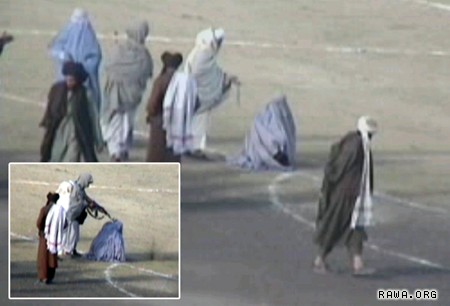Massoumeh Torfeh
After almost nine years of international military operations, billions of dollars in aid and thousands of Afghan and international lives, what Afghanistan needed was a new vision to deal with the complex set of problems. Instead, world leaders pledged £87m to woo the Taliban back into government. Bravo, President Karzai! Bravo, international leaders!

World leaders pledged £87m to woo the Taliban back into government. Bravo, President Karzai! Bravo, international leaders!
The leaders were gathered in the conference, according to Britain's foreign secretary, David Milliband, to support President Karzai in his "clear political strategy". However, the main highlights of that strategy are to bring back the "moderate" Taliban and ask Saudi Arabia to mediate for "reconciliation and reintegration". President Karzai says the Taliban will be chosen from those who would put down their arms and accept the constitution of Afghanistan. These ideas have received support from the international community, but they both appear to be non-starters.
First, the maximum number we are talking about is 5,000 Taliban. That is the number President Karzai suggested in 2007 when he first spoke of his design, and that included the leaders. These will not be hardcore Taliban, since the leaders have already rejected the offer. They will be loose groups of bandits who joined the Taliban just to make money. As such, they can be replaced by the Pakistani Inter-Intelligence Agency, ISI, as quickly as they were "reintegrated". Moreover, they could announce support for the Afghan constitution as quickly as they would renounce it, since they have no particular principles.
Secondly, the Afghan leader said his government would set up a national council for peace and reconciliation, and has asked Saudi Arabia to help guide the process.
Inviting Saudi Arabia to mediate would also seem to have little point. We must not forget where Osama bin Laden originated. Let's also remember that billions of dollars of Saudi support for Yemen against armed rebels has not yielded any results. Nor has it contained al-Qaida militants operating in Yemen.
Not only is this "solution" pointless, it could jeopardise the promise to fight corruption. Any Saudi-negotiated "reintegration" would involve notorious warlords such as Gulbodin Hekmatyar and Abdul Rassul Sayaf who have links with the ISI, the Taliban and al-Qaida. They would be demanding posts for their supporters in the already controversial cabinet.
Secondly, handing out money to the Taliban would be seen as corruption in itself. A recent UN study showed that over the last 12 months, Afghan citizens have paid $2.5bn in bribes – roughly a quarter of the country's gross domestic product. "Corruption is the biggest impediment to improving security, development and governance in Afghanistan," says Antonio Maria Costa, head of the UN Office on Drugs and Crime that conducted the study.
Thus President Karzai's main pledge to the international community for fighting corruption will become an impossible task. He is already criticised extensively for including warlords in his cabinet and as his running mates.
"Only recently he offered a new post to the notorious warlord General Abdul Rashid Dostum," objected Horia Mosadiq, an Afghan civil society activist in a seminar held on Tuesday at the London School of Economics. She expressed deep concern about the status of women and the future for girls if more Taliban were allowed to return. She said the moderate improvements for women achieved over the past nine years would have been in vain. Afghan civil society representatives in the seminar questioned the international rhetoric of speaking about "good governance" and "civil society" on one hand and on the other funding the return of the Taliban.
The more positive aspect of the final communiqué of the London conference was perhaps the international community's pledge to continue to improve the capabilities of the Afghan security forces. Boosting the fledgling Afghan national army and the police by October 2011 and combining it with further training would be an effective long-term move provided it was backed by better pay and conditions for the soldiers and linked to fighting corruption inside the security forces.
Major-General Gordon Messenger, newly appointed by the chief of defence staff as his military spokesman, said in the LSE seminar that the military campaign in Afghanistan would only be effective as a sub-set of other campaigns: crucially governance, reconstruction and development.
Today, Afghanistan is facing 40% unemployment. And unemployment in Afghanistan means hunger since there are no unemployment benefit schemes. That is why more than half the population lives in poverty. This needs to be the main focus of attention if any political strategy in Afghanistan is to be sustainable. Improving Afghan economic capability is as important as strengthening its national army.
President Karzai came to power on a narrow percentage of votes. His government is inherently weak. He was only recently accused of fraud in the elections, and now he seems unable to get the necessary approval for his cabinet from the parliament. The current poor economic performance is an additional impediment. Handing out money to a few thousand Taliban desperados is neither a new strategy nor an effective means of tackling Afghanistan's multiple failures.



